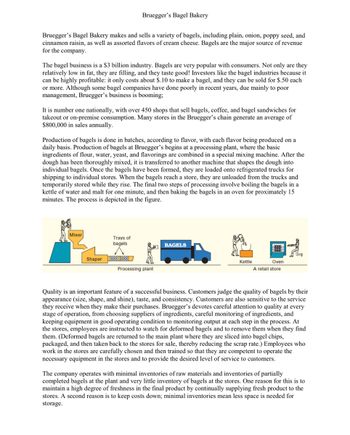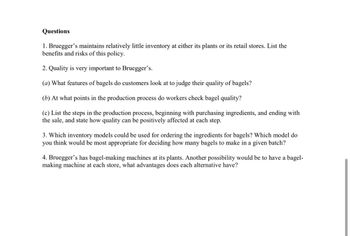
Practical Management Science
6th Edition
ISBN: 9781337406659
Author: WINSTON, Wayne L.
Publisher: Cengage,
expand_more
expand_more
format_list_bulleted
Question

Transcribed Image Text:Bruegger's Bagel Bakery
Bruegger's Bagel Bakery makes and sells a variety of bagels, including plain, onion, poppy seed, and
cinnamon raisin, as well as assorted flavors of cream cheese. Bagels are the major source of revenue
for the company.
The bagel business is a $3 billion industry. Bagels are very popular with consumers. Not only are they
relatively low in fat, they are filling, and they taste good! Investors like the bagel industries because it
can be highly profitable: it only costs about $.10 to make a bagel, and they can be sold for $.50 each
or more. Although some bagel companies have done poorly in recent years, due mainly to poor
management, Bruegger's business is booming;
It is number one nationally, with over 450 shops that sell bagels, coffee, and bagel sandwiches for
takeout or on-premise consumption. Many stores in the Bruegger's chain generate an average of
$800,000 in sales annually.
Production of bagels is done in batches, according to flavor, with each flavor being produced on a
daily basis. Production of bagels at Bruegger's begins at a processing plant, where the basic
ingredients of flour, water, yeast, and flavorings are combined in a special mixing machine. After the
dough has been thoroughly mixed, it is transferred to another machine that shapes the dough into
individual bagels. Once the bagels have been formed, they are loaded onto refrigerated trucks for
shipping to individual stores. When the bagels reach a store, they are unloaded from the trucks and
temporarily stored while they rise. The final two steps of processing involve boiling the bagels in a
kettle of water and malt for one minute, and then baking the bagels in an oven for proximately 15
minutes. The process is depicted in the figure.
Mixer
Trays of
bagels
BAGELS
Shaper 888 888
Processing plant
Kettle
Oven
A retail store
Quality is an important feature of a successful business. Customers judge the quality of bagels by their
appearance (size, shape, and shine), taste, and consistency. Customers are also sensitive to the service
they receive when they make their purchases. Bruegger's devotes careful attention to quality at every
stage of operation, from choosing suppliers of ingredients, careful monitoring of ingredients, and
keeping equipment in good operating condition to monitoring output at each step in the process. At
the stores, employees are instructed to watch for deformed bagels and to remove them when they find
them. (Deformed bagels are returned to the main plant where they are sliced into bagel chips,
packaged, and then taken back to the stores for sale, thereby reducing the scrap rate.) Employees who
work in the stores are carefully chosen and then trained so that they are competent to operate the
necessary equipment in the stores and to provide the desired level of service to customers.
The company operates with minimal inventories of raw materials and inventories of partially
completed bagels at the plant and very little inventory of bagels at the stores. One reason for this is to
maintain a high degree of freshness in the final product by continually supplying fresh product to the
stores. A second reason is to keep costs down; minimal inventories mean less space is needed for
storage.

Transcribed Image Text:Questions
1. Bruegger's maintains relatively little inventory at either its plants or its retail stores. List the
benefits and risks of this policy.
2. Quality is very important to Bruegger's.
(a) What features of bagels do customers look at to judge their quality of bagels?
(b) At what points in the production process do workers check bagel quality?
(c) List the steps in the production process, beginning with purchasing ingredients, and ending with
the sale, and state how quality can be positively affected at each step.
3. Which inventory models could be used for ordering the ingredients for bagels? Which model do
you think would be most appropriate for deciding how many bagels to make in a given batch?
4. Bruegger's has bagel-making machines at its plants. Another possibility would be to have a bagel-
making machine at each store, what advantages does each alternative have?
Expert Solution
This question has been solved!
Explore an expertly crafted, step-by-step solution for a thorough understanding of key concepts.
Step by stepSolved in 2 steps

Knowledge Booster
Similar questions
- Find the factor for a 32% food cost. Next, price a menu item with a Food Cost (FC) of $7.85.arrow_forwardA company that pursues and achieves strategic objectives: Answer C) is frequently in a better position to improve its future financial performance because of the increased competitiveness that flows from the achievement of strategic objectives. D) is likely to be a weak financial performer because diverting resources to the pursuit of strategic objectives takes away from the achievement of financial performance targets. B) is generally not strongly focused on its true mission of making a profit. A) is likely to weaken the achievement of its short-term and long-term financial objectives.arrow_forward1. Describe the threat of substitute products in the automotive manufacturing industry. Are other products emerging in this industry that might compete with existing products? What are these possible competing products? Are these possible competing products cheaper to produce than the industry’s current products? Could these possible competing products force your company out of the market?arrow_forward
- How do changes in menu price affect labor costs?arrow_forward10) In recent years, large retailers have been shifting from bricks-and-mortar operation to an online strategy for the reasons described in three of the following four entries. Select the fourth one, the least plausible entry. (Choose one.) a. Bricks-and-mortar retailing allows customers to touch and see products before they buy, but customers don't care about doing this much anymore. b. Bricks-and-mortar stores have trouble keeping track of the shelf location of specific items, which means customers are often unable to inspect a product or comparison shop when they get to the store. c. Customers depend upon reviews of products by previous customers, a feature largely missing in bricks-and-mortar shopping. d. Bricks-and-mortar retailing usually requires the customer to travel physically to a store as contrasted with the greater convenience of online commerce.arrow_forwardMajor operations and supply planning activities can be grouped into categories based on the relevant time range of the activity. Into what time range category does sales and operations planning fit? O Short-range planning O Immediate planning O Medium-range planning Long-range planning O Strategic planningarrow_forward
- Rivera is know as a leader in the music industry, providing music amplifiers, cabinets, combos, pedals and more. There are a number of music amplifier products marketed under the Rivera brand including the Rivera® award winning Clubster, Fandango, and Knucklehead. The large variety of music amplifiers marketed by Rivera is an example of a: O product equity O product mix O product line O marketing mixarrow_forward1. Describe the threats of new entrants to the automotive manufacturing industry. 2. What barriers do companies face when beginning to supply engines to the automotive manufacturing industry? 3. Are there high costs associated with gaining the expertise necessary to produce goods or provide services for the market?arrow_forward
arrow_back_ios
arrow_forward_ios
Recommended textbooks for you
 Practical Management ScienceOperations ManagementISBN:9781337406659Author:WINSTON, Wayne L.Publisher:Cengage,
Practical Management ScienceOperations ManagementISBN:9781337406659Author:WINSTON, Wayne L.Publisher:Cengage, Operations ManagementOperations ManagementISBN:9781259667473Author:William J StevensonPublisher:McGraw-Hill Education
Operations ManagementOperations ManagementISBN:9781259667473Author:William J StevensonPublisher:McGraw-Hill Education Operations and Supply Chain Management (Mcgraw-hi...Operations ManagementISBN:9781259666100Author:F. Robert Jacobs, Richard B ChasePublisher:McGraw-Hill Education
Operations and Supply Chain Management (Mcgraw-hi...Operations ManagementISBN:9781259666100Author:F. Robert Jacobs, Richard B ChasePublisher:McGraw-Hill Education
 Purchasing and Supply Chain ManagementOperations ManagementISBN:9781285869681Author:Robert M. Monczka, Robert B. Handfield, Larry C. Giunipero, James L. PattersonPublisher:Cengage Learning
Purchasing and Supply Chain ManagementOperations ManagementISBN:9781285869681Author:Robert M. Monczka, Robert B. Handfield, Larry C. Giunipero, James L. PattersonPublisher:Cengage Learning Production and Operations Analysis, Seventh Editi...Operations ManagementISBN:9781478623069Author:Steven Nahmias, Tava Lennon OlsenPublisher:Waveland Press, Inc.
Production and Operations Analysis, Seventh Editi...Operations ManagementISBN:9781478623069Author:Steven Nahmias, Tava Lennon OlsenPublisher:Waveland Press, Inc.

Practical Management Science
Operations Management
ISBN:9781337406659
Author:WINSTON, Wayne L.
Publisher:Cengage,

Operations Management
Operations Management
ISBN:9781259667473
Author:William J Stevenson
Publisher:McGraw-Hill Education

Operations and Supply Chain Management (Mcgraw-hi...
Operations Management
ISBN:9781259666100
Author:F. Robert Jacobs, Richard B Chase
Publisher:McGraw-Hill Education


Purchasing and Supply Chain Management
Operations Management
ISBN:9781285869681
Author:Robert M. Monczka, Robert B. Handfield, Larry C. Giunipero, James L. Patterson
Publisher:Cengage Learning

Production and Operations Analysis, Seventh Editi...
Operations Management
ISBN:9781478623069
Author:Steven Nahmias, Tava Lennon Olsen
Publisher:Waveland Press, Inc.